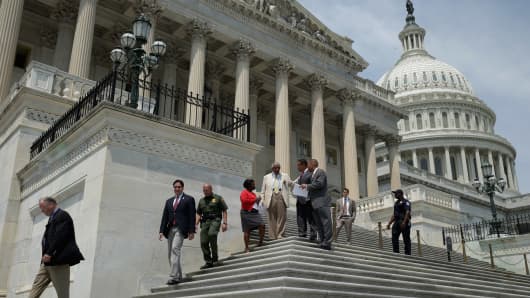(Read more: Economy trumpingSyria with investors)
Some key dates are approaching: The government's spending authority runs out Sept. 30, and even if a continuing resolution is adopted to keep things going, the Treasury loses its borrowing authority in mid-October and likely runs out of cash by Nov. 1.
To keep things going, Congressional Republicans will be demanding some spending concessions from the administration.
Additional sequestration cuts already are scheduled to take place in January, but they modest to the point of almost negligible—from $988 billion in non-emergency discretionary spending to $967 billion.
(Read more: As President Obama goes...so goes the market?)
If those cuts are not reached, things could get interesting.
Goldman Sachs economist Alec Phillips explains:
While Congress can avoid another round of across-the-board cuts and the disruptions they cause by limiting spending to $967bn, to maintain the current funding level Congress would need to pass legislation to modify sequestration. This could potentially involve offsetting the increased spending that would result with more gradual cuts to other parts of the budget and/or increased revenues.
Last time, of course, this level of contention about debt produced an agreement that if Congress did not hit deficit reduction targets, automatic spending cuts would kick in automatically.
Everybody figured things would never get that dire, so naturally they did.
The wild card this time, though, could well be an unusual source: Syria.
President Barack Obama has continued to beat the war drums for a retaliatory attack against the regime of Bashal Assad for its use of chemical weapons against its own citizens.
(Read more: Obama makes his Syria case to Congress)
With Congressional support growing, no one is going to want to talk about cuts in defense spending, which was one of the main sequestration targets.
Phillips sees an economy that faces lighter headwinds from future spending cuts, which never really caused the calamity some expected:
There is very little chance, in our view, that Congress will agree to another package of spending cuts similar to agreement that was attached to the 2011 debt limit increase, so there is a very low risk of meaningful cuts over the next year beyond what is already built into current law.
If any additional budgetary savings were enacted--there is a slim chance that Congress might be able to agree on a package of $200bn or so in savings phased in gradually over ten years--we would expect that some of it might be used to reverse some of the cuts under sequestration scheduled for 2014. Along with the possibility that supplemental military funding might be used to slightly increase the defense budget, the risk tilts slightly toward a less restrictive fiscal stance over coming quarters than the already fading drag on growth from fiscal policy that we assume.
—By CNBC's Jeff Cox. Follow him @JeffCoxCNBCcom on Twitter.





